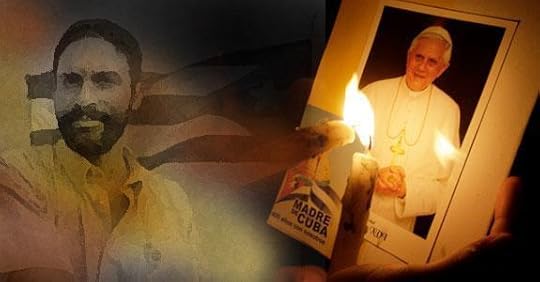Cuba's Conscience: Oscar Biscet in his own words

Cuba's Conscience: Oscar Biscet in his own words | Jordan Allott | Catholic World Report
On March 11, 2011 Dr. Oscar Elias Biscet was released from a maximum-security prison outside Havana. The release of Dr. Biscet, who had spent all but 36 days of the past 11 years in a Cuban prison cell, was negotiated with the help of the Catholic Church and the government of Spain. Dr. Biscet has been called the number-one enemy of the Castro brothers for his non-violent opposition to the Cuban government's human rights violations and its systematic use of forced abortion. In 2007, Dr. Biscet received the Presidential Medal of Freedom in the United States, and he is a finalist for the 2011 Nobel Peace Prize. Because the Cuban government allows its citizens only very limited use of the Internet and other technologies, this interview with CWR was conducted over several weeks and has been translated from Spanish into English.
[Editor's Note: This interview originally appeared in the December 2011 issue of Catholic World Report.]
Six months have now passed since you were released from prison. Can you tell us what this time has been like for you and your family, both spiritually and in terms of everyday life?
Oscar Biscet: You mention two important terms in this question—one is freedom and the other one is the family. Both of them are the product of God's boundless love for human beings. In the Book of Genesis it says: "Then God said, 'Let us make mankind in our image, in our likeness'… male and female he created them." This poetic expression encompasses a profound philosophy and a scientific approach to understanding the world, so necessary nowadays for the behavior of the human race. God is the father of the human family and a paradigm of absolute freedom in the universe. For that reason I positively value having been released in order to be able to live daily life, good [and] bad, with my wife and with the rest of my family—and above all to be able to [work for] fundamental rights for my family and for my people.
Of the 75 opposition leaders, journalists, and librarians arrested during Cuba's 2003 Black Spring, you were one of the last prisoners of conscience to be released. Can you describe the process of your release? During this process, you consistently refused release in exchange for exile. Was that a difficult decision?
Biscet: The process for my release was long, traumatic, and distressing for many.… The institutions involved were not able to carry out a balanced negotiation to benefit the political prisoners while they were waiting to be released. I had made the decision not to leave my country 14 years ago, when in 1998, I was expelled from the hospital where I was working for the mere fact that I peacefully defended the life of the unborn children. They also retaliated against my family. Friends from other nations offered me political asylum but I rejected their proposals. This was very hard because at that time my relatives were being tortured by the Castro regime.
Can you describe your emotions after finally being released in March?
Biscet: It was very pleasant. I was happy and calm because I was returning to my home. At the same time, I was worried, as I had my hopes pinned on [securing] human rights and the freedom of the Cuban people.
How are inmates, both political prisoners and general prisoners, treated inside Cuban prisons? Do you have any stories to share from your time as a prisoner of conscience?
Carl E. Olson's Blog
- Carl E. Olson's profile
- 20 followers



